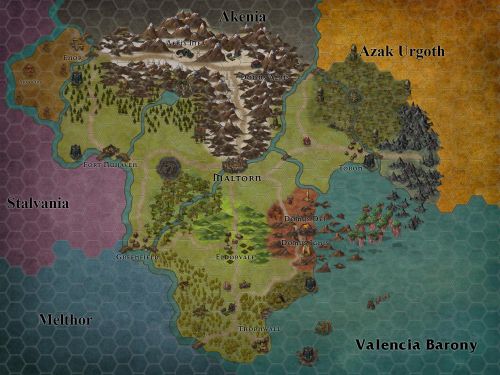Remove these ads. Join the Worldbuilders Guild
In The Shadow Of The Temple
A Pathfinder Playtest game
In the world of Aeon Elementa
|
Full
Once, the world was guarded against evil. In the streets, noble Paladins stood side by side with the city guard. At the borders, the Taldor Military stood firm against barbarians and dragons alike.
And in the shadows, stood the Ordo Templi. Ever vigilant, accountable to none but the Gods, the Templars were the last line of defense against evil.
Of course, it couldn't last.
Though they had foiled their arch enemy Mammon time and time again, he had his revenge in the end. The Templars were slain and the Taldor Empire cast down.
The Templars were gone and the world was without defenders.
Or so most people thought.
When the Inquisitors and the Taldor soldiers came for the Templars, many of them hid, retreating to the corners of the world. No longer living in their fortified, public Temples, they made secret warrens. From here, they secretly protect the world, hunting the monsters that would slay the people, still standing guard against Mammon's vile corruption.
Though most nobles and churches still despise the Templars, considering them responsible for the fall of Taldor at best and outright servants of Mammon at worst, Templars still hunt, still do their duty.
In secrecy.
In the shadows.
Divine
When using Dedication, you dedicate your next action to a particular God. If your next action is a success, you gain the Favor of a God immediately, replacing any previous Favor you had. If it is a Failure, the action instead becomes a Critical Failure. The gods do not look kindly upon failures being laid at their feet.
The following documents outline House Rules:
Ancestries
Setting Specific Rules
Alchemical Weapons
The Founding of the Templar Order
The War Of The False
The Fall of the Templars
The Wrath of the Gods
And in the shadows, stood the Ordo Templi. Ever vigilant, accountable to none but the Gods, the Templars were the last line of defense against evil.
Of course, it couldn't last.
Though they had foiled their arch enemy Mammon time and time again, he had his revenge in the end. The Templars were slain and the Taldor Empire cast down.
The Templars were gone and the world was without defenders.
Or so most people thought.
When the Inquisitors and the Taldor soldiers came for the Templars, many of them hid, retreating to the corners of the world. No longer living in their fortified, public Temples, they made secret warrens. From here, they secretly protect the world, hunting the monsters that would slay the people, still standing guard against Mammon's vile corruption.
Though most nobles and churches still despise the Templars, considering them responsible for the fall of Taldor at best and outright servants of Mammon at worst, Templars still hunt, still do their duty.
In secrecy.
In the shadows.
The Premise
You will be playing as new Temple Initiates, just taken into the organization. That means there are some requirements; The Templars does not take in the impious or those who do not know their way around a battlefield.
The Templars rely on three pillars for their sacred task, each of which has both a mechanical and a narrative function; Faith, Knowledge, and Labor.
The Templars rely on three pillars for their sacred task, each of which has both a mechanical and a narrative function; Faith, Knowledge, and Labor.
Faith
Narrative
The Templars are, above all others, devoted to protecting the creation of the Gods; Mortals. For this reason, the Templars take in only those who have faith in one or more of the gods of The Pantheon. That does not, however, mean that all Templars are "Good". Some Templars venerate all of the gods, calling upon each one as the need arises, while others venerate only a selection or even a single one. A Templar of Marduk may be quiet and contemplative, while a Templar venerating Bacchus above all else would roll in as much wine and merriment as he can between and on missions.
Perhaps ironically, Templars dedicated solely to Elohim has become exceedingly rare in the Alchemical Aeon, as those who tend to follow Elohim often finds the dependence on trickery and discretion disagreeable.
The Gods serve as a guide for Templars and when in doubt about a course of action, prayer and contemplation upon the movement of the Gods is often the answer.
When making a character, you should consider what her relationship with the Gods is - Is she a practical soul, calling upon the gods most befitting of the situation? Does he give his devotion to Gods befitting his own skill and areas of expertise? Or do they focus solely on one deity, personalizing the most divine?
Often, those at the two extremes - Taking in ALL the Gods or just ONE of the Gods - tends to be more religiously devoted, whilst those who selective follow a handful of Gods are less so. To worship every God, one must either truly believe their divine will supersedes morality or be truly afraid of their wrath. To worship only a single God, one must be so devoted as to deny the wisdom and the wrath of others.
Perhaps ironically, Templars dedicated solely to Elohim has become exceedingly rare in the Alchemical Aeon, as those who tend to follow Elohim often finds the dependence on trickery and discretion disagreeable.
The Gods serve as a guide for Templars and when in doubt about a course of action, prayer and contemplation upon the movement of the Gods is often the answer.
When making a character, you should consider what her relationship with the Gods is - Is she a practical soul, calling upon the gods most befitting of the situation? Does he give his devotion to Gods befitting his own skill and areas of expertise? Or do they focus solely on one deity, personalizing the most divine?
Often, those at the two extremes - Taking in ALL the Gods or just ONE of the Gods - tends to be more religiously devoted, whilst those who selective follow a handful of Gods are less so. To worship every God, one must either truly believe their divine will supersedes morality or be truly afraid of their wrath. To worship only a single God, one must be so devoted as to deny the wisdom and the wrath of others.
Mechanical
Mechanically, the guidance of the gods is expressed in Favor.
When you have the Favor of a God, after making a check relating to one of their Domains, you can expend it to gain a reroll.
You can earn Favor in one of two ways and can only ever have the Favor of a single God at a time.
The first way is through Prayer; Whenever you have a quiet moment to meditate and pray, you can ask a God for aid in your coming path. This gives you Favor with the God you prayed to, removing any previous Favor you had.
The second is through Dedication;
Dedication [A]When you have the Favor of a God, after making a check relating to one of their Domains, you can expend it to gain a reroll.
You can earn Favor in one of two ways and can only ever have the Favor of a single God at a time.
The first way is through Prayer; Whenever you have a quiet moment to meditate and pray, you can ask a God for aid in your coming path. This gives you Favor with the God you prayed to, removing any previous Favor you had.
The second is through Dedication;
Divine
When using Dedication, you dedicate your next action to a particular God. If your next action is a success, you gain the Favor of a God immediately, replacing any previous Favor you had. If it is a Failure, the action instead becomes a Critical Failure. The gods do not look kindly upon failures being laid at their feet.
Knowledge
Narrative
The Templars were the best and the brightest, spending their waking moments bettering themselves. This dedication to skill has not waned and the Templars expect their Initiates and siblings to dedicate themselves to the art of battle as much as they do a dedication to the ideals of the Gods. They especially venerate those who train themselves in multiple areas of expertise, to avoid the weaknesses of specialization that the knightly and clerical orders often face.
They don't rush into battle lightly, either; They study their enemies, finding their weakness and exploiting it.
This ties closely in with the Armament Pillar, as Templars will often customize their equipment to use the flaws in the opposition's plans.
They don't rush into battle lightly, either; They study their enemies, finding their weakness and exploiting it.
This ties closely in with the Armament Pillar, as Templars will often customize their equipment to use the flaws in the opposition's plans.
Mechanical
The dedication to Skill is expressed through access to a breadth of abilities gained through training and studies.
When in Downtime, players can study with Templar Teachers and other masters with whom they have at least a Friendly relationship with to gain Skill, Archetype and Multiclass feats outside of the usual feat progression.
When in Downtime, players can study with Templar Teachers and other masters with whom they have at least a Friendly relationship with to gain Skill, Archetype and Multiclass feats outside of the usual feat progression.
Labor
The quality of a weapon can mean the difference between life and death for a Templar and, as such, be the difference between destruction and continuation of entire civilizations. For this reason, Templars do not rely on the common blacksmiths of the land and the blades sold in marketplaces.
Rather, they forge their own weapons and armors. All temples possess one or more Smiths, at the least.
In the glory days, the Templars could afford to just buy the rarest materials. This wealth is almost entirely gone, however. This has forced the Templars to make their own armaments out of ingredients gathered from the corpses of their enemies or plundered from their lairs.
In the Alchemical Age, Templars increasingly favor the use of Alchemical weapons, although many still rely on cold steel and sharpened arrows.
Rather, they forge their own weapons and armors. All temples possess one or more Smiths, at the least.
In the glory days, the Templars could afford to just buy the rarest materials. This wealth is almost entirely gone, however. This has forced the Templars to make their own armaments out of ingredients gathered from the corpses of their enemies or plundered from their lairs.
In the Alchemical Age, Templars increasingly favor the use of Alchemical weapons, although many still rely on cold steel and sharpened arrows.
Mechanical
This game will include a Elemental Crafting System replacing the standard Pathfinder 2 Crafting, relying a great deal on collecting Ingredients with specific properties.
More details will come, but in short, each material has three tags; One Type, one Quality and one Element tag.
This Crafting System has the partial effect of decoupling Magical Item progression from common currency to a certain degree, making gold, silver and copper more of a "Narrative" resource; Something you use on clothes, common tools, inn stays, services and the like. While Poor and Standard materials can usually be purchased for gold, anything with a Quality above that or with an Element tag will be only extremely rarely for sale.
More details will come, but in short, each material has three tags; One Type, one Quality and one Element tag.
This Crafting System has the partial effect of decoupling Magical Item progression from common currency to a certain degree, making gold, silver and copper more of a "Narrative" resource; Something you use on clothes, common tools, inn stays, services and the like. While Poor and Standard materials can usually be purchased for gold, anything with a Quality above that or with an Element tag will be only extremely rarely for sale.
Making Your Character
You play as a first level character, of any of the standard races or Vesk (Nikolaj has details on Vesk).
When you make your background, you should at least answer the following questions:
How did I gain my class?
What about me prompted the Templars to invite me into their secret order?
Why did I choose to join the Templar order?
Does my family know about my joining the Templar Order and how do they feel about it?
What is my relationship with the Gods?
When you make your background, you should at least answer the following questions:
How did I gain my class?
What about me prompted the Templars to invite me into their secret order?
Why did I choose to join the Templar order?
Does my family know about my joining the Templar Order and how do they feel about it?
What is my relationship with the Gods?
Starting Gear
One 5th-level item, two 4th-level items, one 3rd-level item, two 2nd-level items, and 100 gp to spend on any additional items.
House Rules
The following documents outline House Rules:
Ancestries
Setting Specific Rules
Alchemical Weapons
Important Moments In Templar History
The Founding of the Templar Order
The War Of The False
The Fall of the Templars
The Wrath of the Gods








